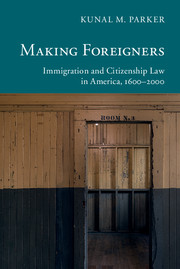Book contents
- Frontmatter
- Contents
- Preface and Acknowledgments
- 1 Introduction
- 2 Foreigners and Borders in British North America
- 3 Logics of Revolution
- 4 Blacks, Indians, and Other Aliens in Antebellum America
- 5 The Rise of the Federal Immigration Order
- 6 Closing the Gates in the Early Twentieth Century
- 7 A Rights Revolution?
- 8 Conclusion and Coda
- Bibliographic Essay
- Index
3 - Logics of Revolution
Published online by Cambridge University Press: 05 September 2015
- Frontmatter
- Contents
- Preface and Acknowledgments
- 1 Introduction
- 2 Foreigners and Borders in British North America
- 3 Logics of Revolution
- 4 Blacks, Indians, and Other Aliens in Antebellum America
- 5 The Rise of the Federal Immigration Order
- 6 Closing the Gates in the Early Twentieth Century
- 7 A Rights Revolution?
- 8 Conclusion and Coda
- Bibliographic Essay
- Index
Summary
Introduction
Conceptions of political membership played a critical role in the dispute that unfolded and culminated in the American Revolution. During the colonial period, Americans’ dealings with aliens, Native Americans, and blacks had driven them to conceive of British subjecthood in instrumental ways, in ways more Lockean than Cokean. This tendency became far more pronounced as Americans moved from repudiating the authority of Parliament to interrogating their allegiance to the king. Contra Coke, Americans began to maintain that protection and allegiance were not mutual, perpetual, and independent obligations growing out of the allegedly natural tie between subject and sovereign. Instead, they were part of the quid pro quo of a Lockean contract, each given in exchange for the other. Were the colonial charters to be annulled, John Adams insisted, the king “would not be bound to protect the people, nor, that I can see, would the people here, who were born here, be, by any principle of common law, bound even to allegiance to the king. The connection would be broken between the crown and the natives of the country.” After the military skirmishes at Lexington, Concord, and Bunker Hill, and after George III declared the North American colonies in rebellion on August 23, 1775, many Americans concluded that their obligations to their monarch could be suspended.
As Americans withdrew their allegiance from George III and severed their connection with Great Britain in formal, public, and communal acts, “citizenship” came to replace “subjecthood.” Building upon American societies’ own voluntary acts of expatriation, the new category of citizenship was supposedly grounded in volitional allegiance, an allegiance that could be assumed and cast off. In 1795, in the course of a legal argument, the Republican lawyer Alexander Dallas distinguished the new American citizenship from the old British subjecthood (which he labeled “allegiance”) in the following terms:
Citizenship, which has arisen from the dissolution of the feudal system … is a substitute for allegiance, corresponding with the new order of things. Allegiance and citizenship, differ, indeed, in almost every characteristic. Citizenship is the effect of compact; allegiance is the offspring of power and necessity. Citizenship is a political tie; allegiance is a territorial tenure. […]
Information
- Type
- Chapter
- Information
- Making ForeignersImmigration and Citizenship Law in America, 1600–2000, pp. 50 - 80Publisher: Cambridge University PressPrint publication year: 2015
